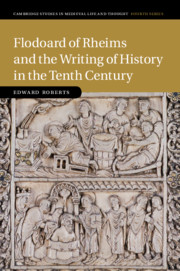Book contents
- Flodoard of Rheims and the Writing of History in the Tenth Century
- Cambridge Studies in Medieval Life and Thought
- Flodoard of Rheims and the Writing of History in the Tenth Century
- Copyright page
- Dedication
- Contents
- Tables
- Acknowledgements
- Abbreviations
- Introduction
- Chapter 1 Flodoard, His Archbishops and the Struggle for Rheims
- Chapter 2 Narrative and History in the Annals
- Chapter 3 Institutional History and Ecclesiastical Property
- Chapter 4 History, Poetry and Intellectual Life
- Chapter 5 Flodoard’s Age of Miracles
- Conclusion
- Bibliography
- Index
Conclusion
History and Historiography in the Tenth Century
Published online by Cambridge University Press: 05 September 2019
- Flodoard of Rheims and the Writing of History in the Tenth Century
- Cambridge Studies in Medieval Life and Thought
- Flodoard of Rheims and the Writing of History in the Tenth Century
- Copyright page
- Dedication
- Contents
- Tables
- Acknowledgements
- Abbreviations
- Introduction
- Chapter 1 Flodoard, His Archbishops and the Struggle for Rheims
- Chapter 2 Narrative and History in the Annals
- Chapter 3 Institutional History and Ecclesiastical Property
- Chapter 4 History, Poetry and Intellectual Life
- Chapter 5 Flodoard’s Age of Miracles
- Conclusion
- Bibliography
- Index
Summary
This short conclusion reflects on the book’s overarching themes and arguments, asking how we should characterise Flodoard and understand his place in the history of medieval historical writing. Several implications for the study of tenth-century political history and the cultural development of the Latin West are re-emphasised. In a concluding discussion of audience, I suggest that the readership of Flodoard’s works may have been quite narrow because he was a ‘liminal’ author of types of history that no longer met the interests or expectations of post-Carolingian audiences.
Keywords
- Type
- Chapter
- Information
- Publisher: Cambridge University PressPrint publication year: 2019

